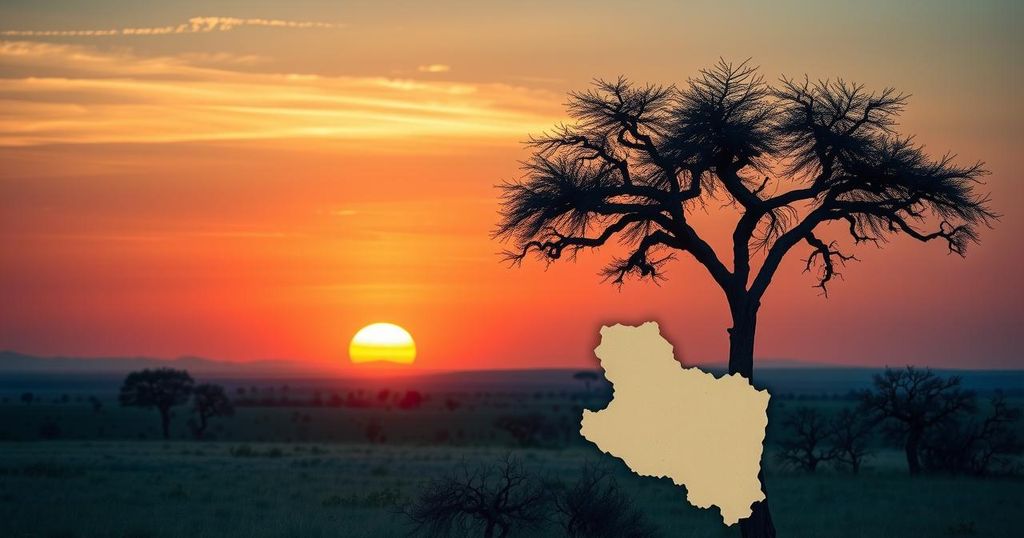Sam Nujoma, the first president of Namibia and a key anti-apartheid activist, died at the age of 95. His leadership from independence in 1990 until 2005 is celebrated, and he is revered as the architect of Namibia’s freedom from colonial rule. Nujoma’s legacy includes his role as a unifying figure, his promotion of democracy, and his advocacy for women’s rights in a patriarchal environment, inspiring pride and resilience among Namibians.
Sam Nujoma, the founding president of independent Namibia, has passed away at the age of 95. His death was confirmed by the current Namibian President, Nangolo Mbumba, who shared that Nujoma died following an illness after being hospitalized in Windhoek. Having served as president from 1990 to 2005, he was revered as the father of the nation, credited with leading Namibia to its independence from apartheid South Africa.
President Mbumba expressed the deep loss felt by the nation, stating, “The foundations of the Republic of Namibia have been shaken.” He highlighted Nujoma’s immense contributions to the country, which included motivating citizens to build a proud and sustainable nation after the struggles of independence. Mbumba also honored Nujoma as a key figure during crucial times in Namibia’s liberation struggle.
As a notable anti-apartheid activist, Nujoma co-founded Namibia’s liberation movement, SWAPO, in the 1960s and played a pivotal role in the lengthy quest for independence that culminated in 1990. He is recognized alongside other prominent African leaders like Nelson Mandela and Robert Mugabe for their efforts to eradicate colonial rule across the continent.
Nujoma is celebrated in Namibia as a charismatic leader who navigated the nation towards democracy following years of colonialism and a brutal independence war. After nearly three decades of exile, he returned to lead the nation during its first democratic elections in late 1989, soon becoming the president after independence was established.
South African President Cyril Ramaphosa paid tribute to Nujoma for his role in the independence movement and lauded his contributions to the anti-apartheid push within South Africa. Ramaphosa noted, “Sam Nujoma inspired the Namibian people to pride and resistance that belied the size of the population.”
Nujoma’s legacy also includes his promotion of national reconciliation in the wake of deep-seated divisions caused by the independence war and apartheid policies. He adopted a pragmatic approach in establishing a democratic constitution and including various stakeholders in governance after independence, despite facing accusations of authoritarianism during his exile.
While Nujoma was known for his strong anti-Western rhetoric and controversial statements, such as claiming AIDS was a biological weapon, he cultivated relationships with various global leaders, showcasing a balance of outreach to both the East and West. Former U.S. President Bill Clinton honored him in 1993 as a democratically transformative figure.
His advocacy for women’s rights was also notable in a region traditionally dominated by patriarchal systems, emphasizing the capabilities of African women in leadership. Nujoma himself rose from modest beginnings, overcoming personal hardships to dedicate his life to Namibia’s liberation, often stating, “I dedicated my life to my country’s liberation.”
Nujoma’s influence extended beyond his political achievements; he worked tirelessly for the country’s progress after decades of strife and underdevelopment. His commitment to the cause is reflected in his beliefs and development initiatives, ensuring a space for dialogue and unity among the diverse populations of Namibia.
In summary, Sam Nujoma’s remarkable contributions to Namibia’s fight against apartheid and his role as its first president have left an indelible mark on the nation. He is remembered not only for his formidable leadership during a pivotal era in Namibian history but also for his vision of a united and democratic society. His legacy will continue to influence and inspire generations to come as Namibia strives for progress and reconciliation.
Original Source: www.cbsnews.com




